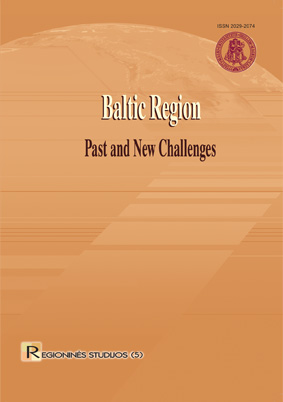Vilnius as a European Capital of Culture: Institutions and Civil Society
Vilnius as a European Capital of Culture: Institutions and Civil Society
Author(s): Domenico CrisafulliSubject(s): Essay|Book Review |Scientific Life
Published by: Vytauto Didžiojo Universitetas
Keywords: civil society; cultural performance; national representation; pilietinė visuomenė; kultūros vyksmas; nacionalinė reprezentacija
Summary/Abstract: Vilnius, the capital of Lithuania, has been declared a European Capital of Culture in 2009, and this official nomination by European Union constitutes another public mark of the process that the Republic of Lithuania carried out from their independence from Soviet Union to their membership in the European Union. To manage all the events that were organized in 2006, the Vilnius municipality and Lithuanian ministry of culture established a public institution named “Vilnius – European Capital of Culture 2009”. At the base of the programme, there is the involvement of different social groups, artistic, cultural and, more in general, volunteer associations, media operators or simple citizens that, through projects, should develop shows, concerts, performances that can represent an official culture accepted as trait-d’union between the European union’s idea of common culture among all members and the specific need of representation of particular and unique culture, tied to a specific and unique identity, of the independent republic of Lithuania. From another point of view, the so called “civil society”, in this case all those social groups, associations, artists and citizens can develop several representations of culture or, more in general, several ways of thinking about national identity, that very often can cause some tension with the official institution. The needs, problems and ideas about culture can differ or be in contrast with the official representation given by the government or requested by the European Union. The expected participation of civil society (groups, associations, artists, citizens, etc.) is, at the same time, a resource and a critical point of the programme. The connection between official goal of representation of a specific idea of culture and the statement to do this through the projects proposed by different groups can create tension and underline the different levels of meanings inside an apparent clear and unequivocal affirmation of culture. Vilnius, Lietuvos sostinė, 2009 metais buvo paskelbtas Europos kultūros sostine, ir šis oficialus Europos Sąjungos pripažinimas yra dar vienas riboženklis Lietuvos Respublikai pereinant iš buvusios Tarybų Sąjungos į Europos Sąjungą. 2006 metais Vilniaus miesto savivaldybės ir Lietuvos kultūros ministerijos pastangomis buvo įkurta viešoji įstaiga „Vilnius – Europos kultūros sostinė 2009“, skirta koordinuoti renginių veiklai. Programos esmė – skirtingų socialinių grupių, meno, kultūros, savanoriškų organizacijų, žiniasklaidos atstovų bei eilinių piliečių bendradarbiavimas organizuojant renginius, koncertus, performansus. Šia veikla siekta pristatyti oficialiąją kultūrą, kuri yra tarsi lydinys, sukurtas iš bendros visoms Europos Sąjungos narėms kultūros ir konkrečios, specifinės kultūros, susijusios su unikalia nepriklausomos Lietuvos Respublikos tapatybe.
Journal: Regioninės studijos
- Issue Year: 2010
- Issue No: 5
- Page Range: 65-76
- Page Count: 12
- Language: English

